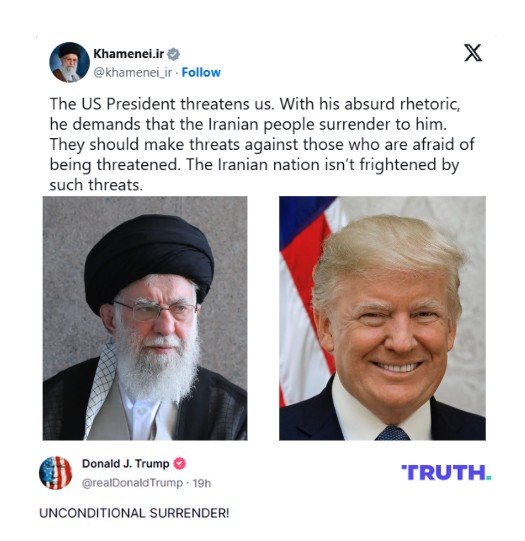In a dramatic escalation of the Israel-Iran crisis, Iran’s Supreme Leader Ayatollah Ali Khamenei issued a defiant message in response to intensifying threats from both former U.S. President Donald Trump and Israeli Prime Minister Benjamin Netanyahu. The confrontation, which has already crossed alarming military thresholds, now appears to be entering an even more volatile phase, marked by direct threats to leadership figures and growing fears of regional warfare.
Khamenei, addressing the Iranian people from an undisclosed location, declared that Iran “will never surrender” to what he described as imperialist pressure from Washington and Tel Aviv. His comments, broadcasted on state media and echoed via social media platform X, came as a reply to President Trump’s stern ultimatum, demanding “unconditional surrender” and hinting at targeted action against the Ayatollah himself. “He is an easy target… but we don’t want to take him out, at least not for now,” Trump warned, while suggesting that if Iran continues its military retaliation, consequences would become “much worse than anything they know.”
Ayatollah Khamenei’s rebuttal was as forceful as it was symbolic. Calling the U.S. threats an example of “arrogant ignorance,” he warned Washington of “irreparable damage” if American forces enter the conflict militarily. “The harm the U.S. will suffer will definitely be irreparable,” he stated, framing Iran’s position as one of resistance, not submission. His message was not only meant to galvanize national support but also to signal to global powers that Iran would not be cowed by the threat of force.
The rapidly deteriorating situation escalated after Israel launched a series of air strikes on Friday targeting Iranian nuclear and military facilities. In a swift and unprecedented response, Iran launched hundreds of ballistic missiles deep into Israeli territory, including populated centers such as Tel Aviv and Jerusalem. Israel’s military, while maintaining that civilian areas were not its primary target, acknowledged that retaliatory strikes in Tehran may impact non-combatants. Defence Minister Yoav Gallant described the looming Israeli response as “necessary” and hinted that Tehran’s citizens could face displacement due to strikes on regime infrastructure.
Iran’s offensive has grown bolder with each passing day. On Wednesday, hypersonic missiles were reportedly launched toward Israeli cities, an escalation that caught the attention of several global security observers. Posting once again on social media, Khamenei wrote, “In the name of God, the battle begins,” followed by a vow to show “no mercy” to what he termed the “terrorist Zionist regime.”
Former President Trump’s rhetoric has only added fuel to an already dangerous fire. In multiple statements on his social media platform Truth Social, Trump painted Iran as incapable of diplomacy, boasting that previous hardliners “spoke bravely, but they didn’t know what was about to happen. They are all DEAD now, and it will only get worse.” His comments, widely condemned in diplomatic circles, further strain the fragile international attempts to contain the crisis. While Trump no longer holds office, his influence and statements carry weight, especially in an election year in the United States.
The Ayatollah’s firm stance plays well domestically, especially in a climate where Iranian national pride and sovereignty are being invoked as rallying cries. But beyond Iran’s borders, his refusal to step back raises the stakes dramatically. Analysts say the risk of a broader regional war involving Lebanon, Syria, and Gulf nations is no longer speculative—it is increasingly probable. The rhetoric between global powers is growing harsher, and the space for backchannel diplomacy is rapidly shrinking.
Amid this intensifying clash, India, along with other regional powers, continues to maintain a delicate balance. With strategic ties to both Israel and Iran, and deepening relations with the United States, New Delhi faces one of its toughest diplomatic tightropes yet. Officials in the Ministry of External Affairs have reiterated India’s call for “maximum restraint” and “respect for international norms,” even as private channels work to assess the safety of Indian nationals in the region. India’s neutral stance is rooted in its long-standing policy of non-alignment and its vested interests in energy security, trade, and regional stability.
With high-stakes rhetoric, cross-border missile attacks, and threats of targeted killings, the Israel-Iran conflict appears to be hurtling toward a point of no return. The coming days will test not only the resolve of Tehran and Tel Aviv but also the credibility of global diplomacy. Whether a backchannel breakthrough can avert disaster or if the situation spirals into full-blown warfare may depend on how seriously the warnings from both sides are taken—and whether cooler heads can prevail before the next strike.
#IranIsraelConflict #AyatollahKhamenei #DonaldTrump #IsraelDefense #BallisticMissiles #MiddleEastTensions #IndiaDiplomacy #GeopoliticalCrisis #TehranUnderAttack #GlobalSecurityCrisis
This is an auto web-generated news web story.





